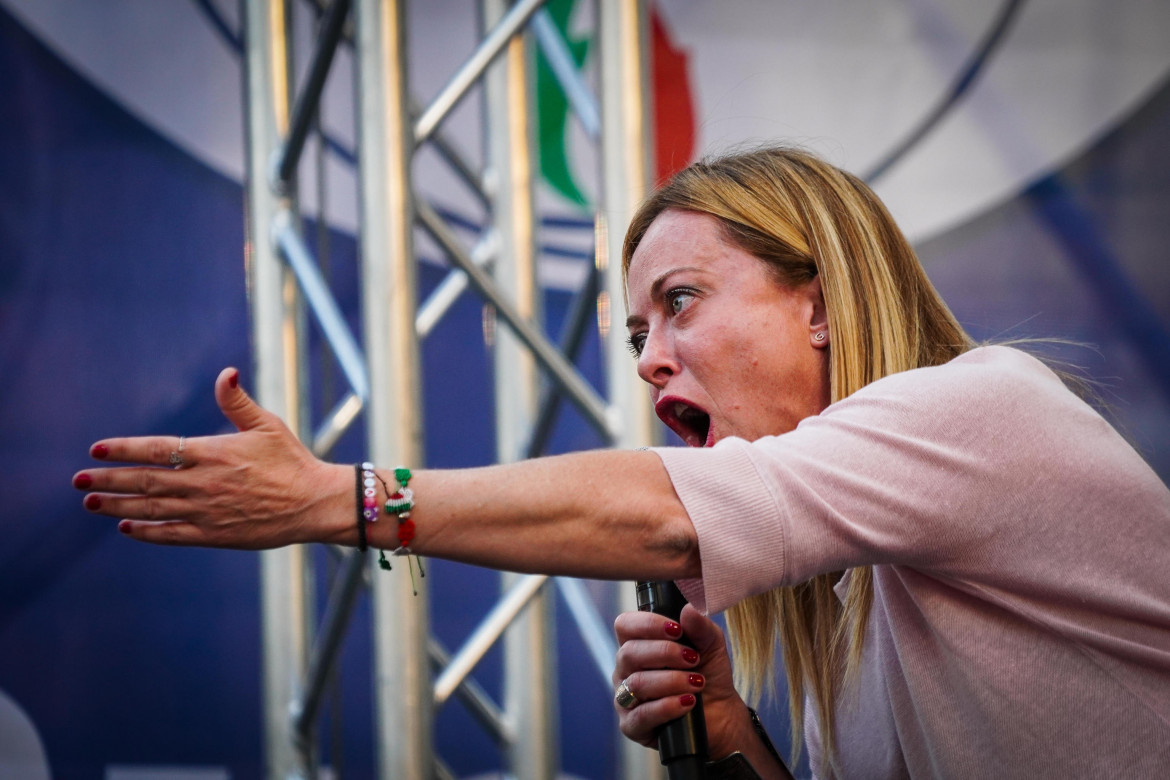Reportage
Giorgia complained of spontaneous protests by teenagers as ‘provocations to riot’
The protests against Meloni so far have been peaceful and colorful, almost naive in their spontaneity. Groups of very young people, little over 18, are expressing their disagreement on issues that are part of everyday life for them.

With one week to go before the general elections, Giorgia Meloni, the effective leader of the center-right which is considered the favorite at the polls, is showing signs of nervousness for the first time. It comes after yet another occasion on which a few dozen young and very young people showed up at one of her rallies and voiced their dissent, this time in Caserta on Sunday.
Meloni called for no less than the intervention of the Interior Ministry: “In no developed democracy is the only opposition to the government the subject of systematic attacks by ministers, institutional offices and big media,” Meloni claimed. “And, above all, in no Western democracy does the government consciously allow provocations that could easily result in riots, during the election campaign, during political demonstrations by the opposition. These people talk about Europe, but their model is Ceausescu’s regime. We are not intimidated by those who hate freedom and the sovereignty of the people.”
An unofficial reaction was leaked from the Interior Ministry, to the effect that they do not consider the peaceful protest of young men and women a threat to public order. The response basically argues that if you decide to speak in a free public square, you have to accept some public criticism as well, as long as everything takes place peacefully.
The protests against Meloni so far have been peaceful and colorful, almost naive in their spontaneity. Groups of very young people, little over 18, are expressing their disagreement on issues that are part of everyday life for them: gender equality, migrant rights and citizenship for second generation migrants, the liberalization of cannabis, climate advocacy. All issues that Meloni either rejects or pretends not to see.
On September 2, in Catania, she had tried to defuse any protests by inviting a boy demonstrating for LGBTQ rights on her stage. The following week, on September 10, in Trento’s Piazza Santa Maria Maggiore, in the face of booing from dozens of people, she relaunched a classic Salvini narrative: that those protesting are trendy radicals just off their daddy’s yacht. The young people responded to her without hesitation, saying they were veterans of apple picking in the mountains of Trentino. Not even a hint of eating caviar on a yacht, as she tried to paint them.
The FdI political program manager Giovanbattista Fazzolari even speaks of a “strategy of tension” against her. It’s quite the opposite: there is no single mind behind the protests. They are grassroots-level, improvised mobilizations. Nonetheless, the mechanism has been repeated in similar forms in several cities where the candidate for prime minister came for the election campaign.
For example, Ferdinando Errichiello, 25, an activist at Laboratorio Millepiani, one of the city’s social spaces, recounts: “A few days before she arrived, we were contacted by numerous people. All very young, many without any political experience. They wanted to make their voices of dissent heard.”
“I called the Minister of the Interior at the end of a rally in Matera, after this happened in Trento, in Genoa, in Cagliari, in Milan,” Meloni complained. “The result is that the same thing happened in Caserta. I will call her back to ask if it’s possible to have an election campaign like that.”
For the record, in Matera she was greeted by a banner that read, “Full application of Law 194: FdI limits access to abortion.”
Protesters in Caserta say they have been the object of threats from members of Fratelli d’Italia; those more advanced in years say that to paint a picture of the inexperience of those who innocently went with a protest sign among the post-fascists. They recount that Meloni had a few moments of difficulty, because in a square that was not very full, attended by a few hundred people, some of whom had been bussed in from Naples, she found herself with almost a hundred protesters against her: “We were the tip of the iceberg,” they said, “In a province where there are 40,000 citizenship income recipients, they had to expect some form of protest.”
Meloni’s nervousness is the telltale sign of an expected electoral victory that may have fragile legs from the standpoint of maintaining power and building social roots.
Observers argue that FdI has inherited the old center-right pool of support, but it doesn’t break through among the young electorate: in the latest surveys it ranked only fourth, just ahead of Lega and Forza Italia, among voters who are between 18 and 24 years old. These are people whose ways of life, open to differences and seeking freedoms and rights that would be appropriate to the new challenges, do not coincide with the narratives of the right-wingers.
They represent the Achilles’ heel of the side that is preparing to govern.
Originally published at https://ilmanifesto.it/il-tallone-di-giorgia-sono-i-giovani-che-chiedono-diritti on 2022-09-20
